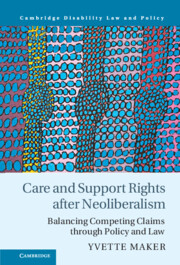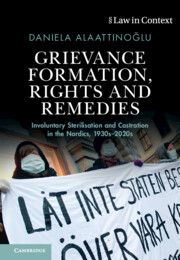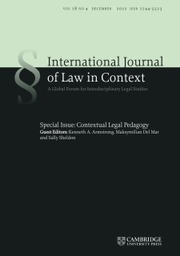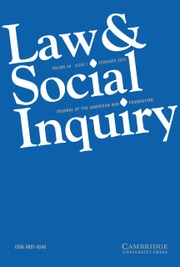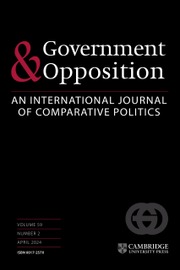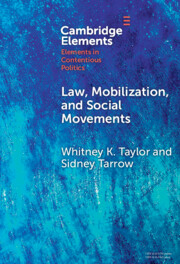The Social Constitution
Embedding Social Rights Through Legal Mobilization
$125.00 (F)
Part of Cambridge Studies in Law and Society
- Author: Whitney K. Taylor, San Francisco State University
- Date Published: June 2023
- availability: Available
- format: Hardback
- isbn: 9781009367769
$
125.00
(F)
Hardback
Other available formats:
eBook
Looking for an examination copy?
If you are interested in the title for your course we can consider offering an examination copy. To register your interest please contact [email protected] providing details of the course you are teaching.
-
In The Social Constitution, Whitney Taylor examines the conditions under which new constitutional rights become meaningful and institutionalized. Taylor introduces the concept of 'embedding' constitutional law to clarify how particular visions of law come to take root both socially and legally. Constitutional embedding can occur through legal mobilization, as citizens understand the law in their own way and make legal claims - or choose not to - on the basis of that understanding, and as judges decide whether and how to respond to legal claims. These interactions ultimately construct the content and strength of the constitutional order. Taylor draws on more than a year of fieldwork across Colombia and multiple sources of data, including semi-structured interviews, original surveys, legal documents, and participation observation. This title is part of the Flip it Open Programme and may also be available Open Access. Check our website Cambridge Core for details.
Read more- Develops a novel approach to legal mobilization that is relational and interactive
- Explains the everyday impacts of constitutionalism
- Utilizes empirical data from Colombia to examine the Colombian constitution of 1991
Reviews & endorsements
‘Taylor’s excellent book details how rights, etched into the surface of a society and its politics through inclusion in a constitutional text, slowly begin to sink down and structure interactions among citizens, the relationship between citizens and the state, and the state itself. Using extensive fieldwork and original data from Colombia and South Africa, Taylor shows how legal mobilization moves this process along – a process she describes as the social and legal embedding of the constitution. The book fills an important gap in constitutional studies by addressing the transition from rights on paper to rights in action.’ Daniel M. Brinks, University of Texas at Austin
See more reviews‘The Social Constitution describes the process through which social rights transit from the constitutional text to the core of the normative and empirical expectations of regular citizens, judges, and sociopolitical actors. Cycles of legal claim-making and judicial receptivity to demands of healthcare or housing breathe life into constitutional rights, progressively weaving the social fabric. Because the success of these processes is contingent and by no means assured, The Social Constitution insightfully identifies the conditions that make it more likely. Combining clear conceptualization, straightforward arguments, and careful in-depth empirical analysis on Colombia, Whitney Taylor’s book is an outstanding contribution to one of the fundamental issues in constitutional theory, judicial politics, and sociolegal analysis.’ Julio Ríos-Figueroa, ITAM (Mexico City)
‘The Social Constitution is a brilliant, important contribution to the scholarship on legal mobilization, institutional innovation, and social change. Professor Taylor offers a theoretically sophisticated argument analyzing legal arrangements that are practical, democratic alternatives to neoliberalism in and beyond the Global South. The project is anchored in compelling bottom-up empirical research attentive to both the positive possibilities and vexing constraints of embedded law for advancing social justice. Highly recommended!’ Michael McCann, University of Washington
‘Whitney Taylor is emerging as a leading thinker in a new wave of scholarship on law and courts. In The Social Constitution, she draws on a wealth of data to carefully unpack the social and legal dimensions of the embedding of social constitutional rights. Moving beyond the field’s traditional focus on countries in the Global North and an emphasis on civil and political rights, Taylor sheds new light on how and why constitutions matter.’ Lisa Vanhala, University College London
‘In this uncommonly elegant book, Whitney Taylor single-handedly reframes our understanding of the social welfare promises found in many of the world’s constitutions, showing with rich and subtle data that rights to healthcare, housing, clean water, and so much more have the potential to become real in the lives of ordinary people when supported from below by ongoing litigation, and from above by receptive judicial rulings. A compelling analysis, brimming with important ideas, and powerfully supported with a range of evidence.’ Charles Epp, The University of Kansas
Customer reviews
Not yet reviewed
Be the first to review
Review was not posted due to profanity
×Product details
- Date Published: June 2023
- format: Hardback
- isbn: 9781009367769
- length: 274 pages
- dimensions: 235 x 158 x 21 mm
- weight: 0.54kg
- availability: Available
Table of Contents
1. Introduction: the social constitution
2. Constitutional embedding through legal mobilization
3. Expectations and transformations of Colombian constitutional law
4. Social embedding
5. Legal embedding
6. Challenges to embedding: legal legibility
7. Challenges to embedding: power struggles
8. Challenges to embedding: workload
9. Partial constitutional embedding: the case of South Africa
10. Conclusion. Social constitutionalism and the politics of rights
Appendix: interviewees.
Sorry, this resource is locked
Please register or sign in to request access. If you are having problems accessing these resources please email [email protected]
Register Sign in» Proceed
You are now leaving the Cambridge University Press website. Your eBook purchase and download will be completed by our partner www.ebooks.com. Please see the permission section of the www.ebooks.com catalogue page for details of the print & copy limits on our eBooks.
Continue ×Are you sure you want to delete your account?
This cannot be undone.
Thank you for your feedback which will help us improve our service.
If you requested a response, we will make sure to get back to you shortly.
×

